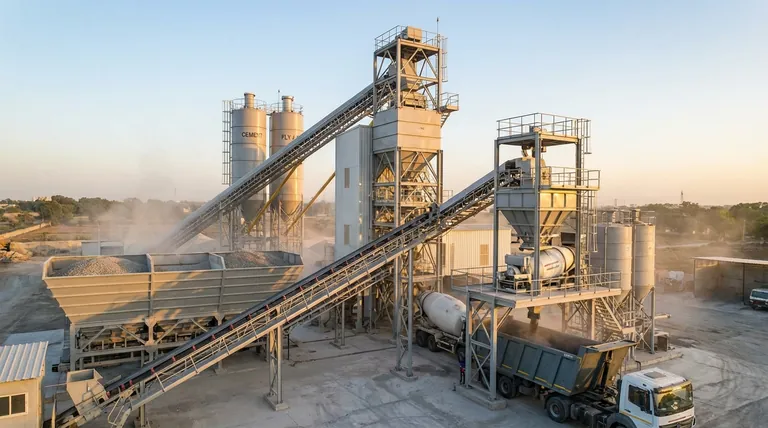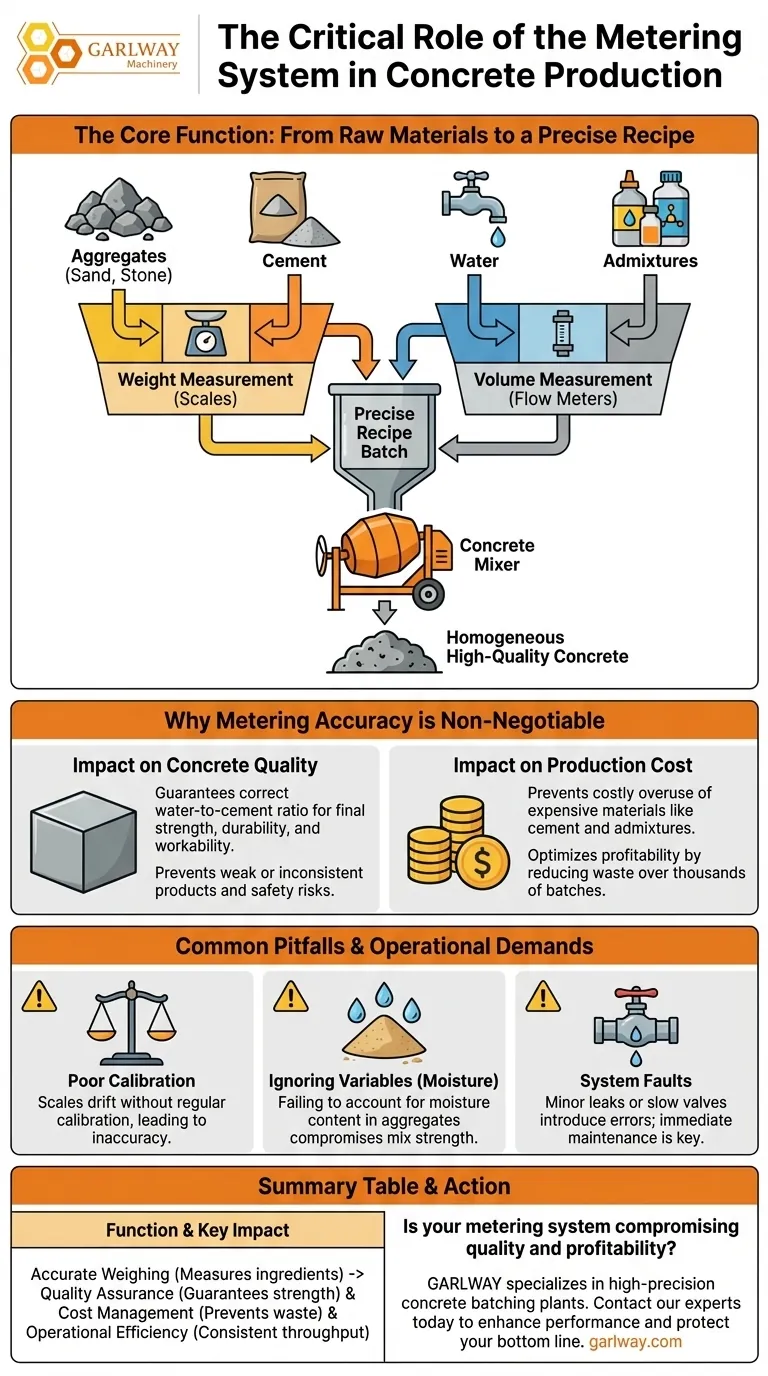In essence, the metering system in a concrete mixing station serves as the plant's precise measuring instrument. It is responsible for accurately weighing and measuring all the individual ingredients—aggregates like sand and stone, cement, water, and any chemical admixtures—according to a specific recipe before they are combined in the mixer.
The core role of the metering system extends far beyond simple measurement; it is the absolute foundation of quality control and cost management in concrete production. The accuracy of this single system directly determines the final strength of the concrete and prevents the costly waste of materials.

The Core Function: From Raw Materials to a Precise Recipe
The entire concrete production process hinges on starting with the correct proportions of raw materials. The metering system, also known as the batching system, is engineered to guarantee this happens consistently for every single batch.
What is Being Measured?
The system handles several distinct material types, each requiring a specific measurement method. These include aggregates (sand, gravel, crushed stone), cementitious materials (cement), water, and chemical admixtures.
How are Materials Measured?
To ensure precision, different methods are used for solids and liquids. Aggregates and cement are typically measured by weight using highly accurate scales. Water and liquid admixtures are measured by volume using flow metering devices.
The Link to the Final Mix
Once all ingredients are accurately metered into a "batch," they are discharged into the concrete mixer. The mixer then combines them to create a homogeneous final product, but it can only work with the ingredients it's given. An incorrect measurement at the start cannot be fixed by mixing.
Why Metering Accuracy is Non-Negotiable
Controlling measurement accuracy is essential to meet the strict process requirements of concrete production. Even small deviations can have significant consequences for both the product and the business.
Impact on Concrete Quality
The final strength, durability, and workability of concrete are dictated by the ratios of its components, especially the water-to-cement ratio. An inaccurate metering system can lead to a weak or inconsistent product that fails to meet engineering specifications, posing a serious safety risk.
Impact on Production Cost
Cement and admixtures are the most expensive ingredients in a concrete mix. If the metering system consistently adds even a small extra percentage of these materials, the cumulative cost over thousands of batches becomes substantial. Precise metering prevents this waste and optimizes profitability.
Common Pitfalls and Operational Demands
While modern metering systems are highly reliable, they are not immune to issues that can compromise the entire production process. Vigilance and proper maintenance are key.
The Risk of Poor Calibration
Scales and meters can drift out of calibration over time due to wear, tear, and environmental factors. Without regular inspection and recalibration, the system's measurements will become progressively less accurate, leading to poor quality concrete and material waste.
Failure to Account for Variables
A common issue is failing to account for the moisture content in aggregates like sand. If the system measures sand by weight without compensating for the water it already contains, the total water in the final mix will be incorrect, compromising its strength.
Ignoring System Faults
Minor issues, such as small leaks at discharge gates or slow-acting valves, can introduce errors into the measurement process. These seemingly small faults must be addressed immediately to maintain the integrity of every batch.
Applying This to Your Operation
To ensure your metering system supports your operational goals, focus your attention based on your primary business driver.
- If your primary focus is consistent structural quality: Prioritize the rigorous and regular calibration of all scales and meters to guarantee every batch meets its design specifications.
- If your primary focus is cost control: Scrutinize the measurement accuracy of cement and admixtures, as precise control over these high-cost items offers the greatest financial benefit.
- If your primary focus is high production throughput: Ensure your system can achieve its measurements quickly without sacrificing accuracy, and verify that its control system is responsive and reliable.
Ultimately, viewing the metering system as the heart of your plant's quality control is the key to producing reliable and cost-effective concrete.
Summary Table:
| Function | Key Impact |
|---|---|
| Accurate Weighing | Measures aggregates, cement, water, and admixtures by weight/volume. |
| Quality Assurance | Guarantees correct water-to-cement ratio for concrete strength and durability. |
| Cost Management | Prevents costly overuse of expensive materials like cement and admixtures. |
| Operational Efficiency | Enables consistent, high-throughput production of reliable concrete batches. |
Is your concrete batching plant's metering system compromising your quality and profitability?
GARLWAY specializes in high-precision construction machinery, including robust and accurate concrete batching plants, mixers, and winches. Our solutions are designed for construction companies and contractors who demand reliability and cost-efficiency in every project.
Let us help you achieve flawless concrete production. Contact our experts today to discuss how our metering systems can enhance your plant's performance and protect your bottom line.
Visual Guide

People Also Ask
- What are the key inspection items for a concrete mixing station? Ensure Safety, Quality, and Uptime
- How does a screw conveyor function in a concrete batching plant? Precision Powder Transport Explained
- What are the advantages of investing in a well-designed batching plant? Achieve Unmatched Quality and Efficiency
- What factors influence the production scale of a commercial concrete mixing station? Maximize Your Output Efficiency
- What causes insufficient lubrication in new mixing stations? Prevent Premature Wear and Downtime
- What is needed for a concrete plant? The Essential Components for Reliable Production
- What is the most critical issue for the water supply system of a concrete mixing station in winter? Prevent Costly Freeze Damage
- How does a concrete batching plant contribute to cost savings in construction projects? Gain Financial Control and Efficiency